San Francisco’s initiative offering guaranteed cash to low-income Black and Hispanic transgender residents faces legal challenges despite its good intentions. Judicial Watch has filed a lawsuit against the Guaranteed Income for Trans People (GIFT) program in San Francisco, claiming it violates California law by discriminating based on race, ethnicity, sex, and gender identity. Three taxpayers are represented in the lawsuit, asserting that the program’s distribution of taxpayer money to transgender individuals based on these factors goes against the state’s constitution.

Legal Battle Unfolds Over Guaranteed Income for Black and Hispanic Transgender Residents in San Francisco
Legal Battle Erupts as Judicial Watch Challenges San Francisco’s Guaranteed-Income Program – Allegations of Unlawful Discrimination
Judicial Watch President Tom Fitton expressed concerns, stating, “The transgender extremists running San Francisco are illegally using taxpayer money to hand out free cash to transgender individuals based on race and sex in blatant violation of the state’s constitution.”
The legal complaint, filed in San Francisco Superior Court, seeks a permanent injunction to prevent city officials from continuing the guaranteed income payments. The plaintiffs argue that the program infringes upon the Equal Protection Clause of the state constitution.
READ ALSO: Claim $1,600 To $2,000 In Child Tax Credits Based On Family Size! Discover How American Families Can Claim
Controversial San Francisco Guaranteed-Income Program Faces Legal Battle Over Eligibility Criteria
Mayor London Breed introduced the guaranteed-income program in November 2022, aiming to provide $1,200 per month for up to 18 months to 55 low-income San Franciscans on reloadable debit cards. However, eligibility for the program is tied to specific race- and sex-based criteria. The GIFT program explicitly prioritizes enrollment for individuals who identify as Transgender, Non-Binary, Gender Non-Conforming, and Intersex (TGI), particularly if they are Black and Hispanic, Indigenous, or People of Color (BIPOC), homeless, disabled, youth or elders, monolingual Spanish-speakers, and those considered “legally vulnerable.”
The term “legally vulnerable” includes individuals who are undocumented, involved in survival sex trades, or have a history of incarceration. The lawsuit aims for a permanent injunction against the guaranteed income distribution, arguing that it is in violation of the state’s Equal Protection Clause, emphasizing the need for fairness and non-discrimination in public programs.

















































